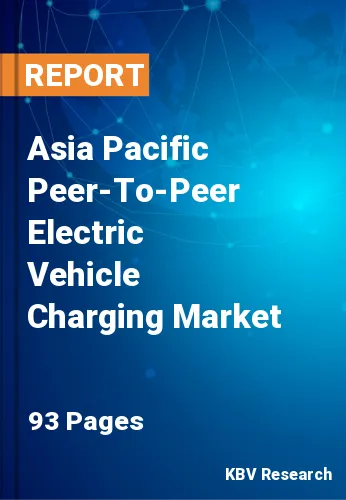The Asia Pacific Peer-To-Peer Electric Vehicle Charging Market would witness market growth of 21.4% CAGR during the forecast period (2022-2028).
P2P electric vehicle (EV) charging is a recent application of blockchain-based P2P smart contracts that is rapidly growing. Range anxiety is a major barrier to the broad adoption of electric cars (EVs). Significant EV prospects are worried about going out of battery power for long travels without access to an electric car charger. Long-distance travel must be meticulously planned to ensure the availability of charging stations and charging time must be factored into the commute. P2P electric vehicle charging can be used to solve this problem and make EVs more viable.
Multiple EV producers and original equipment manufacturers (OEMs) are working to enhance electric car and charging infrastructure connectivity, which is expected to improve peer-to-peer charging networks. Furthermore, governments all over the world are continually allocating space for the installation of electric car charging facilities in residential areas, which is projected to generate profitable prospects for the market. For example, in March 2021, the Indian government mandated that buildings in New Delhi with more than 100 parking spaces, such as hospitals, malls, and hotels set aside 5% of the parking area for electric vehicles and charging stations.
Peer-to-peer electric car charging is becoming more popular due to the rising desire for electric vehicles across the world, as well as government subsidies and regulations aimed at increasing sales of electric vehicles. In addition, the implementation of infrastructure provision in parking spaces has increased sales of peer-to-peer EV charging stations.
China's government is concentrating on giving incentives to encourage the sale of electric vehicles in this region. Countries such as India are attempting to increase electric car sales, offering market development prospects. In the next evaluation period, increased government efforts to promote the sale of electric vehicles are likely to generate chances for market growth. Countries are attempting to increase electric car sales, which is creating market growth potential. China's government offers incentives to encourage people to buy electric vehicles.
By the end of 2020, China had established over 800,000 electric vehicle charging stations for public usage, up from 516,000 in 2019 and 300,000 in 2018. China constructed 112,000 public charging stations in just one month in December 2020. China now has over 3 million passenger electric vehicles and accounted for half of all international sales in 2019. In addition, China has about 219,000 commercial electric trucks and over 500,000 electric buses (98 percent of the world's total).
As a national strategy, Japan is trying to equip infrastructure for charging. The target capacity of 5000 rapid and 2 million normal-charge devices by 2020 is stated in the Next-generation automobile plan 2010, created in 2010 by joint efforts by the government and industry.
The China market dominated the Asia Pacific Peer-To-Peer Electric Vehicle Charging Market by Country in 2021, and would continue to be a dominant market till 2028; thereby, achieving a market value of $37.7 million by 2028. The Japan market is anticipated to grow at a CAGR of 20.7% during (2022 - 2028). Additionally, The Taiwan market would showcase a CAGR of 22.5% during (2022 - 2028).
Based on Application, the market is segmented into Residential (Apartments and Private Homes) and Commercial (Destination Charging Station, Fleet Charging Station, Workplace Charging Station, and Others). Based on Charger Type, the market is segmented into Level 2 and Level 1. Based on countries, the market is segmented into China, Japan, Taiwan, India, South Korea, Singapore, and Rest of Asia Pacific.
Free Valuable Insights: The Worldwide Peer-To-Peer Electric Vehicle Charging Market is Projected to reach USD 363.4 Million by 2028, at a CAGR of 20.6%
The market research report covers the analysis of key stake holders of the market. Key companies profiled in the report include ChargePoint Holdings, Inc., Enphase Energy, Inc. (ClipperCreek, Inc.), Enel X Italia Srl (Enel Group), EVBox (Engie SA), EVmeter LTD., Shell Recharge Solutions (Shell plc), Innogy SE (E. ON SE), Power Hero, Inc., and Webasto Group.
By Application
By Charger Type
By Country
Our team of dedicated experts can provide you with attractive expansion opportunities for your business.

